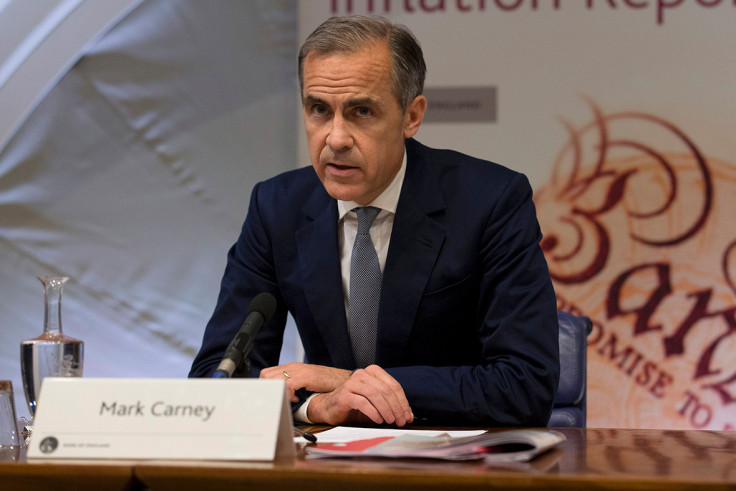Bank of England slashes growth forecast for the UK economy
BoE warns UK economy will remain 'sluggish' over the next two years and expects inflation to peak at 3% in October.

The Bank of England has slashed forecasts for the UK economy for the next two years in its latest quarterly inflation report, warning that Britain's economic growth will remain "sluggish" for the foreseeable future.
Publishing forecasts at the conclusion of its latest Monetary Policy Committee (MPC) meeting on Thursday (3 August), the BoE cut its headline growth projection for this year from 1.9% to 1.7%, while forecast for growth in 2018 was downgraded from 1.7% to 1.6%.
The Bank, which kept interest rates unchanged at a historic low of 0.25% following a 6-2 vote in favour, added it expects inflation as measured by the consumer price index (CPI) to peak at 3% in October this year.
Inflation is then forecast to fall to 2.58% in 2018, before peaking at 2.19% and 2.22% in 2019 and 2020 respectively, marginally above the Bank's 2% target.
The threshold was breached for the first time in four years in March this year and inflation has been running above the BoE's intended target ever since.
Governor Mark Carney said: "Investment has been weaker than we otherwise would have expected in a very strong world. So the consequence of that is starting to build. The speed limit of the economy, if you will, has slowed."
Data released last month by the Office for National Statistics (ONS) showed inflation rose 2.7% in June after hitting a four-year high of 2.9% in May. Meanwhile, last week, the ONS said Britain's economy grew 0.3% on a quarterly basis in the three months to the end of June, in line with forecast and higher than the 0.2% gain recorded in the first quarter.
However, the rate of expansion was half of that recorded by the Eurozone as a whole.
On a year-on-year basis, meanwhile, the UK's GDP grew 1.7% in the second quarter, down from the 2% reading recorded in the previous three months, but matching analysts' expectations
The Bank's latest forecast comes a day after a report released by the National Institute of Economic and Social Research (NIESR) stated Britain's economy will shrug off a difficult start to the year and roar back into life over the next six months, potentially forcing the BoE to hike interest rates a year earlier than expected.
According to the NIESR, the ongoing decline in the pound will trigger a boom in exports which, coupled with a sharp increase in wages, could see Britain's economy expand 1.7% and 1.9% in 2017 and 2018 respectively.
That, in turn, would be enough to convince the BoE to raise interest rates as early as next spring, some 12 months ahead of its previous projection.
Meanwhile, last month, the International Monetary Fund said it expects the UK economy to grow by 1.7% this year, compared with the 2% it forecast in April, while growth forecast for 2018 remained unchanged at 1.5%.
More worryingly for consumers, the BoE also cut its wage growth forecast from 3.5% to 3%, adding regular pay growth excluding bonuses was expected to have been only 2.2% in the second quarter of 2017.

Naeem Aslam, chief market analyst at Think Markets UK, said: "It is difficult for the bank to move the needle when real income growth is negative and saving rate is at 50 years low.
"So you do not want to punish consumers who are already choking. Not to mention we have Brexit where we have no clear sign and direction in which we are sailing."
In response, the pound, which was riding high in recent sessions, retreated sharply as the market soaked in comments from the BOE.
At 12:53pm BST, the British currency was exchanging at $1.3151; down 0.54% against the greenback. The pound also retreated 0.44% versus the euro, changing hands at €1.1106.
"The central bank's forecast is that the UK will exit the EU smoothly, despite some indications that the Government's position is currently not clear," said Shilen Shah, bond strategist at Investec Wealth & Investment.
"Given the relatively tight labour market and weak productivity growth, the central bank continues to assume that the output gap will be closed within three years even though Brexit continues to be the elephant in the room."
© Copyright IBTimes 2025. All rights reserved.






















